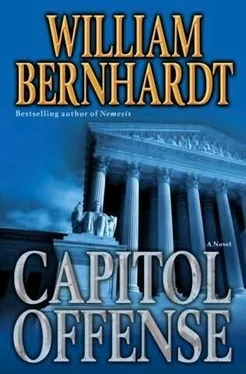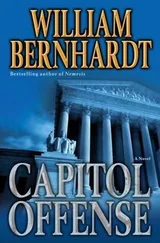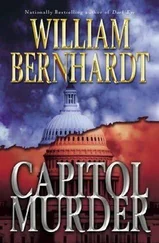Ben liked the result the judge was rambling toward, but was concerned by McPartland’s lack of focus. He seemed to be shuffling about, not really making his point. Ben began to wonder if he was up to a trial of this magnitude.
The judge slammed his gavel. “Bail is set in the amount of one million dollars. When you have your bond together, make the proper arrangements with the officer on the second floor. Now about the trial-”
“As soon as possible,” Ben said, rising. “We’re ready. There are few facts in question.” And not much evidence that could help them, since they were planning a defense based upon Dennis’s mental state, not on the evidence. A long wait till trial would only give the prosecution more time to turn up evidence that might be used against them.
Guillerman looked at Ben, obviously surprised. He shrugged. “If the defense is ready, so are we.”
“Very well. I’ll plug this into the first available slot. Thank you, gentlemen. This hearing is dismissed.”
The tumult rose with such suddenness it was as if a door had suddenly been opened onto an elementary school playground. It was almost deafening. Many people-not all of them reporters-hurled questions at Ben, which he pointedly ignored.
Guillerman pulled Ben to one side. “I’m only saying this because I really am a fan. You’ll never win on temporary insanity.”
“I guess we’ll see.”
“I don’t blame you for trying. But I know more about the facts of this case than you do, and I’m telling you-you cannot make that stick.”
“I appreciate your concern.” Sort of. “But I’m not thinking on my feet. I would never advance a theory I didn’t believe was viable.”
“And if you’re contemplating jury nullification, put that out of your head right now. Judge McPartland won’t let it happen. No matter how you dress it up. He’ll shoot it down.”
“Well, you never know. I’m full of surprises.”
“I know that. But I think this time you’ve gone one surprise too far.”
“Time will tell, right?”
Guillerman shook his head, then smiled. “Fine. Play it your way. Can’t say I didn’t warn you.”
Ben returned to his own table.
“Nice job,” Christina said, but Ben could see she was not altogether pleased.
“Excellent,” Dennis said, grabbing his hand and shaking it. “You had me a little worried back in the jail cell. But that was fantastic. You can really pour on the fire when you get worked up, huh?”
“I was doing my job.”
“And doing it darn well. The most important thing is that you seemed like you really believed it. That’s what sells a jury.”
“That, plus evidence. And truth.”
“It’s important for the jury to believe that the lawyer likes his client. Gives credibility to the claims of innocence.”
“We don’t have to prove innocence,” Ben said. “Only not proven guilty.” And he added to himself: Thank goodness.
“Well, anyway, I’m pleased, Ben. I guess everything I heard about you was true. But I don’t have a million dollars. I do have a trust fund I could use toward bail, but it’s not enough.”
Ben nodded. “We’ll get a bond. It still won’t be cheap, but we’ll find a way. You may have to take out a loan. It’ll be worth it. You don’t need to spend more time in jail.”
“You need to spend it in our office,” Christina said, packing her materials away. “Now that Ben has so brilliantly put this case on the fast track, we’re going to have to work night and day to get ready.”
“That’s fine,” Dennis said. “I’m willing. Whatever you want.” He rubbed his hands together. “This is very encouraging.”
Ben saw Christina’s eyes narrow.
“I’ve read that people who don’t get bail are found guilty nine times out of ten. And the judge’s reaction suggests that we’ve done a decent job of spinning public opinion. I think we need another press conference, Ben. Soon, on the courthouse steps. If the psychiatrist is available, maybe he should come, too. Those potential jurors will be watching.”
He moved toward the door, where a dozen reporters eagerly waited to get their hands on him.
Christina gave her husband a fierce look. “Ben…”
“I know, Christina. I know.”
Ben stood shoulder to shoulder with his newly sprung and spruced-up client, staring at the vast array of microphones and minicams assembled on the plaza outside the Tulsa County courthouse. It was important that Dennis be present and that they all see him as he was, a good, intelligent, clean-cut professional who had recently lost his wife. Not a monster, not a violent man.
Just the same, Ben planned to do all the talking.
“We applaud Judge McPartland’s actions. It would have been much easier to take the usual path and avoid controversy. But instead of jumping on the media bandwagon, he saw the facts and circumstances clearly and realized that Dennis Thomas is no threat to anyone. He does not deserve to be incarcerated, not now or at any time in the future.
“It is all too easy in this reactionary age to heighten the drama and act as if each and every crime is of equal horror, but that is simply not the case. Not every youth should be tried as an adult. Not every defendant should receive the maximum sentence. We can rise above the visceral need for retribution. We are better than that. Those old attitudes have produced the current mess in the criminal justice system-over 2.2 million people in prison, the highest incarceration rate of any nation, more than four times the world average.”
Ben scanned his audience. So far they all seemed attentive. He suspected he was not swaying the reporter from Fox News, and several others as well, but at least no one was heckling. “The reality, which Judge McPartland recognized, is that Dennis was subjected to circumstances that would tax the mental stability of even the most solid citizen. Who could live knowing that the police department could have saved his wife-and chose not to do so? Who would not be tormented by that knowledge? Temporary insanity is not a gimmick dreamed up by lawyers; it is a very real and debilitating mental state, one that all of us could experience given the right circumstances. It is time that we as a nation recognize that fact and stop acting as if harsh punishment will solve all our problems. Dennis Thomas presents no threat to society. He should not be incarcerated.”
Ben never directly said he should be found not guilty, but of course, that was the implicit message. Prospective jurors didn’t have to wrestle with whether they genuinely believed in the concept of temporary insanity. That was the tool they would use. The goal was to convince the jury that this man should not go to prison, regardless of whether you think he committed the crime. So, ladies and gentlemen of the jury, make whatever finding you must to make sure he doesn’t end up behind bars.
Ben briefly considered avoiding questions altogether, but the crowd had been so respectful during his prepared remarks that he decided, possibly contrary to the lessons of past experience, to give it a go. He pointed toward a woman standing in the front row. She had a ponytail and a fresh, friendly face. The quantum of makeup suggested that she was a television anchorperson, but she looked too nice to be mean.
“What would you say to Detective Sentz’s two young daughters, now that you’re advocating that their father’s murderer should go free without any punishment?”
Ah, well. You can’t judge a book…
“Forgive me for saying so, ma’am, but you’re exploiting those children to drum up controversy and get yourself a lead story. And to avoid the main issue. Dennis Thomas has also been bereaved, if I may remind you. His wife suffered the most extraordinary pain imaginable for seven days running. I would hope that we could extend our sympathies to all the victims of this case. But the question here is whether Dennis Thomas should spend the rest of his life in prison, and I fail to see how that would help those two girls or anyone else.”
Читать дальше








